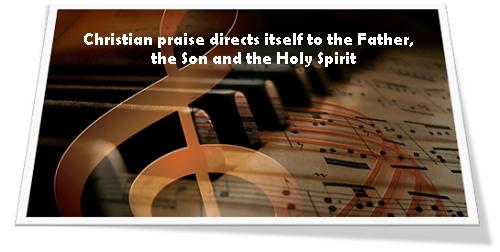The Praise of God
The Praise of God

Praise is deeply rooted in the Old Testament. The Hebrew root word berakah is related to the verbs to bless, to praise, to exalt. We often encounter the root of this word in the Old Testament, most notably in the history of the patriarchs, in the book of Deuteronomy and in the Psalms.
When God bestows His blessing, He favours the one so blessed with His saving and life-giving power. This blessing can rest on animals (Genesis 1:22), on the seventh day (Genesis 2:3), on a woman (Genesis 17:16), on a field (Genesis 27:27), etc.
When people bless God in their praise, they declare that God is the Source of all life-giving power. It is the same as praising or exalting Him (as in Genesis 24:18, Deuteronomy 8:10, and Psalm 66:8). In this case, praise is an expression of thanksgiving and wonder. Often, the reason for such praise is given (as in Genesis 14:20). Blessing takes place before the face of God (Genesis 27:7), mentioning Him by name (Genesis 48:20) and with uplifted hands (Leviticus 9:22). In Numbers 6:23-27 a set formula for such a blessing is given.
Often, God is blessed because of a specific act, such as in Genesis 24:27. The great deeds of God evoke praises that resound in day-to-day living. This praise is also heard as part of Old Testament worship (cf. 1 Kings 8:14ff and 8:55ff). Praise is given a most significant role in the Psalms (such as in Psalm 41:14; 72:18ff; 89:53 and 106:48).
Praise is closely woven into the Psalms. The Psalms often express in broad terms who God is and what He does. In doing so, they encapsulate the fullness of God, exalting Him in His being, and in His activity. Thanksgiving resounds in exclamations such as ‘Praise the LORD!’ and ‘God is great!’ Praise is also offered as a direct response to a specific act of God. In such cases, His act is explicitly mentioned, and praise is joyfully offered. In the psalms of prayer, the fact that God hears such prayer is frequently mentioned, and that in turn also leads to praise. Often, God is then exalted because of who He is. In Qur’anic and Jewish literature also, praise takes a prominent role.
Praise in the New Testament⤒🔗
In the New Testament, praise is most commonly found in the synoptic gospels, in the letters of Paul, and in Hebrews. Its use closely resembles that of the Old Testament. At mealtimes, both praise and thanksgiving are often heard. The expression eulogetos is consistently used in the New Testament to refer to the praise of God.
In Luke 1, we read about the announcement of John’s birth to Zechariah in the temple, and in Luke 24:53 we read that the disciples stayed continually at the temple, praising God. Luke 1:68-75 is one long song of praise, drawing heavily on the Old Testament. In it, we often hear the language of the Psalms (see, among others, Psalm 41:14). Luke 1 highlights the saving work of God; His grace and mercy are praised in song.
In Acts 2:47, the praise of God is characteristic for the first congregation. And in Acts 10:46, the Holy Spirit empowers the Gentiles also to give praise to God. And in a very remarkable way, James 5:13 connects prayer and singing praise.
On the one hand, Ephesians 1:3ff; 1 Peter 1:3ff and 2 Corinthians 1:3ff, show evidence of a strong bond with Old Testament praise. On the other hand, they also bring out something distinctly Christian: (...the God and Father of our Lord Jesus Christ...). Brief expressions of praise are found in Romans 1:25 and 9:5, and also in 2 Corinthians 11:31. In each case, a set formulation follows the name of God: God ... who is forever praised.

The doxology in Ephesians 1 is one of the most elaborate in the New Testament. It focuses on three aspects: God, Christ, and the church. We should note the recurring theme in the verses 6, 12 and 14. The ground for this praise is the blessing of God in Jesus Christ (ch 1:3), and the wealth of this blessing is further explored in what follows. In this way, Ephesians 1 forms a song of praise on the redemption God has provided, a redemption in which the author himself has a part. He invokes the church’s traditional liturgical inheritance to praise God for His specific acts of intervention in history.
This language of prayer and adoration permeates the whole chapter. And it is the author’s aim to carry his audience along with him. At the same time, the doxology of Ephesians 1 forms an introduction to what is developed in the rest of the letter.
In addition to Ephesians 1, ch 2:14-18 and 3:20-21 add significantly to this theme. And Paul’s exhortation in ch 5:18-21also deserves our attention. In Scripture, praise is primarily a response to God and His work of redemption. It is the Spirit who works this response. The source, the essence and the aim of this praise are to be found in God Himself.
Man’s praise of God is not just a pious wish: it is a believing acknowledgement. And often, its secondary aim is to urge fellow believers to join in this praise and adoration. Christian praise directs itself to the Father, the Son and the Holy Spirit (note, for instance, Ephesians 5:19-20). Praise is not just a ‘decoration’: it is an essential part of the Christian life. Praise gives expression to the very ground of our Christian existence. Our praise gives voice to our believing response (worked by the Spirit) to the revelation of God Himself. True praise is the greatest goal of everyone and everything.

Add new comment